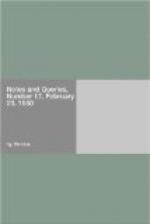Be this as it may, my attention has just now been recalled to the question by my accidentally meeting with one of Owen’s epigrams, which shows that in his time there was some sort of salting at Oxford, and also of peppering at Winchester. As I doubt not that you have readers well acquainted with the customs of both these seats of learning, perhaps some may be good enough to afford information. Owen was at Oxford not many years after Whitgift had been Master of Trinity at Cambridge, if (as Wood states) he took his bachelor’s degree in 1590. The epigram is as follows:—
“Oxoniae salsus (juvenis tum) more
vetusto;
Wintoniaeque (puer tum) piperatus
eram.
Si quid inest nostro piperisve salisve
libello,
Oxoniense sal est, Wintoniense
piper.”
It is No. 64 in that book of epigrams which Owen inscribed “Ad Carolum Eboracensem, fratrem Principis, filium Regis,” p. 205, edit. Elz, 1628. 12mo. I give this full reference in order to express my most hearty sympathy with the righteous indignation of my highly respected friend, your correspondent “L.S.” (No. 15 p. 230.), against imperfect references. I do not, however, agree with him in thinking it fortunate that he is not a “despotic monarch;” on the contrary, now that I have not to take up verses, or construe Greek to him, I should like it of all things; and I am sure the world would be much the better for it.
S.R. MAITLAND.
Gloucester, Feb. 18. 1850.
* * * * *
A FEW DODO QUERIES.
The discovery and speedy extinction of that extraordinary bird the DODO, belongs rather to {262} human history than to pure zoology, and I therefore hope that a few Queries relating to this curious subject will be admissible into your publication. I have already, in the work entitled The Dodo and its Kindred, and in the Supplementary notices inserted last year in the Annals and Magazine of Natural History (ser. 2. vol. iii. pp. 136, 259; vol. iv. p. 335), endeavoured to collect together the omne scitum of the Dodo-history, but I am satisfied that the omne scibile is not yet attained.




